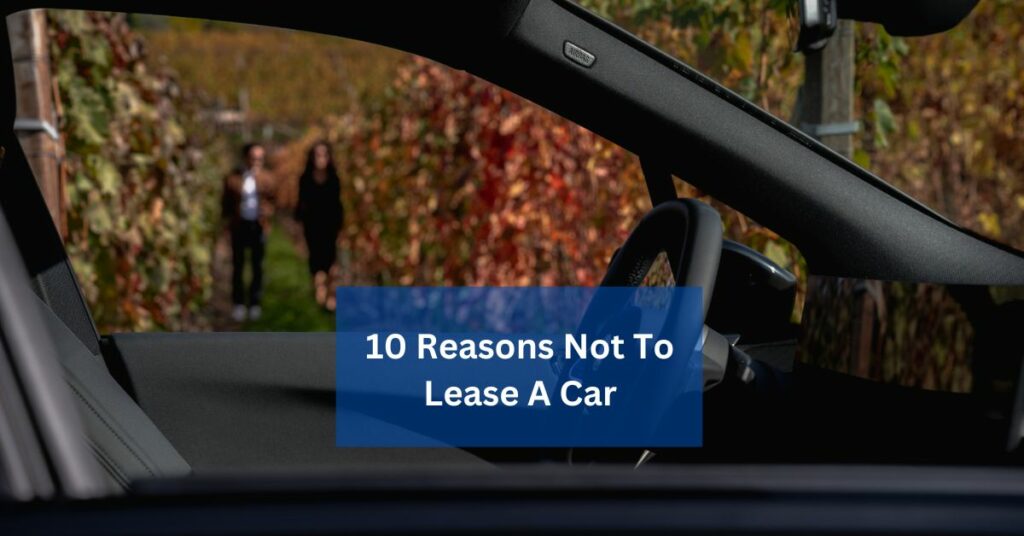10 Reasons Not To Lease A Car – Learn What To Consider Before Signing A Lease Agreement!

Are you considering leasing a car but feeling uncertain if it’s the right choice for you? If so, you’re not alone. As someone who values financial stability and wants to make the most informed decision possible, it’s essential to explore all angles before committing to a lease agreement.
Leasing a car might not be ideal for everyone due to factors like limited mileage restrictions, lack of ownership, higher long-term costs, condition requirements, restrictions on modifications, early termination fees, absence of ownership benefits, the potential for higher insurance costs, limited flexibility, and excess wear and tear charges.
In this article, we’ll delve into ten reasons why leasing a car might not align with your individual needs and preferences.
1. Limited Mileage Restrictions – One Of 10 Reasons Not To Lease A Car!
Leasing a car often entails strict mileage limitations, typically ranging from 10,000 to 15,000 miles per year, with additional fees incurred for exceeding this limit. For many drivers, especially those with long commutes or frequent travel, staying within this threshold can be challenging, leading to substantial financial penalties.
Lease companies impose these restrictions to safeguard the vehicle’s resale value, manage depreciation, and mitigate risk exposure. To prevent exceeding the mileage limit, drivers should monitor their driving habits and consider purchasing additional miles upfront if needed.
Excess mileage fees typically range from $0.10 to $0.25 per mile, necessitating careful planning to avoid unexpected expenses at the end of the lease term.
2. Lack of Ownership
When you lease a car, it’s like borrowing it for a while instead of owning it. Here’s why not owning a car might be a worry for some people:
No Gaining Value: When you buy a car, you slowly build up value in it as you make payments. This means you can sell it later for money. But with leasing, you’re only paying for using the car, so you don’t gain any value in it over time.
Limited Control: When you lease, you can’t make big changes to the car, like adding cool stuff or driving it as much as you want. The lease contract usually has rules about how you can use the car.
No Perks of Ownership: When you own a car, you can sell it or trade it for another one whenever you like. You can also make it look and drive the way you want. But with leasing, you miss out on these benefits.
Cost Concerns: While leasing can mean lower monthly payments, it can end up costing more in the long run because you don’t own the car. So, you’re always paying for something you won’t own at the end.
End-of-Lease Duties: When your lease is up, you have to give the car back in good shape. If it’s damaged, you might have to pay extra. You might also face fees if you’ve driven too much or want to end the lease early.
3. Higher Long-Term Costs – Here Are Some Reasons Why Leasing Could End Up Costing You More In The Long Run!
1. Extra Fees:
Lease agreements often come with extra charges, like:
Starting fees: You have to pay these when you first lease the car, covering paperwork costs.
Ending fees: Charged when you return the car at the end of the lease.
Mileage fees: If you drive more than the allowed miles, you’ll have to pay extra for each mile.
Charges for damage: If the car has more wear and tear than normal, you’ll be charged for repairs.
2. Losing Money to Depreciation:
When you lease, you’re paying for the car’s decrease in value over time. Most cars lose value quickly in the first few years, so you end up paying a lot without owning anything in the end.
3. Not Owning Anything:
Unlike buying a car, leasing means you won’t own it outright. This means you won’t have anything valuable at the end of the lease.
4. Stuck in a Fixed Term:
Leases lock you into a set time, usually a few years. If your situation changes, like if you need a different car, you might have to pay extra to end the lease early.
5. More Expensive Insurance:
Leases usually need more expensive insurance, which means higher monthly payments.
6. Extra Expenses:
Besides monthly payments, you might have to pay for things like repairs not covered by the lease or any changes you want to make to the car.
4. Meeting The 10 Reasons Not To Lease A Car Agreement:
When you lease a car, you have to follow certain rules about how you take care of the vehicle. These rules are called “condition requirements.” Let’s break down what these requirements are all about and why they’re important:
1. Normal Wear and Tear: It’s okay if the car gets a little worn out from regular use, like small scratches or dings. Lease agreements usually expect this, so you won’t get in trouble for it.
2. Excessive Wear and Tear: If the car has more damage than what’s considered normal, you might have to pay extra when you return it. This could be things like big scratches, dents, or really messy interiors.
3. Repairs: You have to take care of the car by getting regular check-ups and fixing any problems that come up. If you don’t, you might have to pay for it later.
4. Outside Condition: The outside of the car should look pretty good when you return it. If there’s a lot of damage, you might have to pay to get it fixed.
5. Inside Condition: Keep the inside of the car clean and in good shape. Stains, tears, or other damage could cost you extra when you give the car back.
6. Mechanical Condition: Make sure the car works well during the lease. If something goes wrong, get it fixed quickly to avoid more problems later.
5. Restrictions On Modifications:
Leasing a car often comes with strict restrictions on modifications, limiting your ability to customize the vehicle according to your preferences. Unlike owning a car outright, where you have the freedom to make alterations as you see fit, leasing agreements typically prohibit any changes to the leased vehicle’s appearance or performance.
6. What Modifications Are Prohibited? – 10 Reasons Not To Lease A Car!
Exterior Modifications: Lease agreements typically prohibit alterations to the vehicle’s exterior, such as aftermarket body kits, spoilers, or paint jobs. Even something as simple as adding decals or stripes may be off-limits.
Interior Modifications: Lease agreements often restrict changes to the vehicle’s interior, such as installing custom upholstery, adding aftermarket audio systems, or modifying the dashboard or center console.
Performance Modifications: Lease agreements typically prohibit any modifications that could alter the vehicle’s performance or mechanical systems. This includes upgrades such as aftermarket exhaust systems, engine tuning, or suspension modifications.
7. No Ownership Benefits Explained Simply – Discover More 10 Reasons Not To Lease A Car!
Leasing a car means you don’t own it, which can be a concern for some because you don’t build equity in the vehicle like you would with buying. You also have limited control over modifications and usage, miss out on benefits of ownership like selling or customizing the car, and may end up paying more in the long run without owning the asset.
Additionally, returning the leased car at the end of the term comes with obligations and potential fees, making it essential to carefully consider whether leasing aligns with your needs and preferences before committing to a lease agreement.
8. Potential For Higher Insurance Costs:
When you lease a car, the insurance costs can go up because leasing companies want more protection for the car. This means you might need more expensive insurance that covers accidents, theft, and damage. Sometimes, you’ll also need gap insurance to cover what’s left on the lease if the car gets wrecked.
Leasing contracts might ask for higher limits on liability and a minimum amount you have to pay before insurance helps with repairs, affecting how much you pay for insurance. And since the leasing company still owns the car, they need to be on your insurance to know if anything happens to it.
So, when you’re thinking about leasing, don’t forget to check out different insurance options and think about things like your driving record and where you live, as they can change how much you pay for insurance.
9. Limited Flexibility In Lease Agreements:
Leasing a car isn’t as flexible as buying one outright. You’re stuck with it for a fixed time, usually 2-4 years, while with ownership, you can sell or trade it whenever. Also, there are strict limits on how much you can drive. If you go over, it costs a lot extra, which can be hard if your commute changes.
You can’t really customize the car either, which is a bummer for people who like to personalize their rides. And if you need to end the lease early, it’s gonna cost you big time, especially if something unexpected happens, like moving for a new job.
Plus, there might be rules on how you can use the car, like no commercial use or needing permission for certain activities, which can limit what you do with it.
10. Excess Wear And Tear Charges – Understanding The Costs!
Excess wear and tear charges are fees that lessees may face when returning a leased vehicle, covering damage beyond normal wear and tear as defined in the lease agreement. Examples include exterior scratches, interior stains, mechanical wear, exceeding mileage limits, and insufficient maintenance.
Charges are assessed through a comprehensive inspection at the lease term’s end, with costs varying based on damage extent and leasing company policies.
To avoid these charges, lessees should maintain the vehicle regularly, drive responsibly, keep it clean, and promptly address any damage. Such proactive measures can help ensure a smooth return process and minimize unexpected expenses.
Frequently Asked Questions:
1. Is leasing a car a good idea?
Whether leasing a car is a good idea depends on your individual circumstances and preferences. While leasing can offer lower monthly payments and the opportunity to drive a new vehicle every few years, it also comes with limitations and potential costs that may not be suitable for everyone.
2. How do I know if leasing is right for me?
To determine if leasing is right for you, consider factors such as your driving habits, budget, and long-term goals. Evaluate the pros and cons of leasing compared to buying a car, and carefully read and understand the terms of any lease agreement before signing.
2. Can I negotiate a lease agreement?
Yes, it’s possible to negotiate certain terms of a lease agreement, such as the monthly payment, mileage limit, and upfront costs. However, the extent to which you can negotiate may vary depending on the dealership and leasing company.
Conclusion:
While leasing a car can offer certain benefits, such as lower monthly payments and the opportunity to drive a new vehicle every few years, it’s essential to consider the potential drawbacks before committing to a lease agreement.
From mileage restrictions to lack of ownership benefits, leasing may not be the best option for everyone. Before making a decision, carefully weigh the pros and cons and consider your individual needs and preferences.
Read More:



